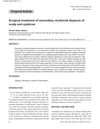TLDR Adults and adolescents with severe alopecia areata are willing to take significant health risks for a better chance of hair regrowth.
The study "Treatment preferences of adults and adolescents with alopecia areata: A discrete choice experiment" involved 321 participants (201 adults and 120 adolescents) from the US and five European countries. The research found that both adults and adolescents with severe alopecia areata (AA) are willing to accept significant treatment-related risks, including serious infections, blood clots, and cancer, to increase the probability of hair regrowth. The most important attribute to both groups was a 50% probability of achieving scalp hair regrowth. For an increase in the probability of scalp hair regrowth from 0% to 20%, adults were willing to accept a mean 3-year risk of serious infection, cancer, and blood clots of 7.4%, 2.5%, and 9.3%, respectively. Adolescents were willing to accept a 3.3% increase in the risk of cancer for the same benefit. The study's findings provide important, quantitative preference information to guide the development of new treatments, inform clinical guidelines and regulatory decisions, and facilitate shared decision-making at the point of care.
 148 citations
,
March 2022 in “The New England Journal of Medicine”
148 citations
,
March 2022 in “The New England Journal of Medicine” Baricitinib was effective in treating alopecia areata in two major trials.
 22 citations
,
November 2021 in “Dermatology and Therapy”
22 citations
,
November 2021 in “Dermatology and Therapy” The AAPPO questionnaire is a reliable tool for assessing hair loss impact in alopecia areata patients.
40 citations
,
June 2021 in “Clinical, cosmetic and investigational dermatology” JAK inhibitors show promise in effectively treating hair loss from alopecia areata.
 144 citations
,
July 2015 in “Clinical, Cosmetic and Investigational Dermatology”
144 citations
,
July 2015 in “Clinical, Cosmetic and Investigational Dermatology” Alopecia areata is a common autoimmune disease affecting about 2% of people, causing significant disability and often associated with mental health issues and other autoimmune conditions.
110 citations
,
December 2013 in “The journal of investigative dermatology. Symposium proceedings/The Journal of investigative dermatology symposium proceedings” Alopecia areata is a genetic and immune-related hair loss condition that is often associated with other autoimmune diseases and does not typically cause permanent damage to hair follicles.
 148 citations
,
December 2018 in “Journal of autoimmunity”
148 citations
,
December 2018 in “Journal of autoimmunity” Alopecia areata is an autoimmune disease causing patchy hair loss, often with other autoimmune disorders, but its exact causes are unknown.
 4 citations
,
November 2018 in “JAAD case reports”
4 citations
,
November 2018 in “JAAD case reports” Alopecia areata can sometimes appear as a straight line of hair loss instead of round patches.
May 2018 in “Journal of cosmetology & trichology” Combining platelet-rich plasma therapy with prostaglandin-F eye drops can significantly regrow hair in alopecia universalis.
 January 2009 in “Indian Journal of Plastic Surgery”
January 2009 in “Indian Journal of Plastic Surgery” Surgical methods for hair loss due to scarring should be chosen based on the size, location, and shape of the area, with most patients seeing good results.







